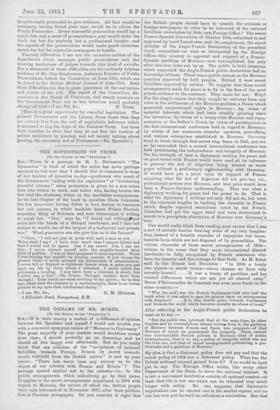• THE COMMITTEE ON PATENT MEDICINES.
[TO TED EDITOR OP THE "SPECTATOR.")
Sin,—The report of the Committee, and what follows it, ought to put an end to the vile trade in quack medicines, for the protection of which not one honest word can be said. The people of the United Kingdom spend a sum estimated at two millions and a half a year on " patent " medicines. A certain proportion of proprietary remedies are genuine pre- parations, some of them of high quality, but the great majority are simply "nothing in a bottle," as Mr. Wells puts it. Practically the only cost in putting these things on the market is the cost of advertising them. The trade is fraudulent, and is, in fact, a crime against the law as it stands, though the law is never enforced.
If the makers and vendors of these things were the only' interest affected there would be no doubt about legislation to put an end to the trade. Unfortunately a considerable 'section of the Press has an interest in the trade, too, and, shameful as it is to have to confess it, one cannot say that this may not be an active influence against reform. Fortunately not all the Press is affected. Some journals are clean.
The ideal legislation would probably be something on the lines of the Foods and Drugs Act, but with much severer penalties. In the case of quack medicines a small central department of medical experts could do the whole work of inspection. Whenever an advertisement appeared of a drug which claims to cure nearly everything or to cure incurable diseases this department should have the preparation ana- lysed and report the medical absurdity of the claims made to the Director of Public Prosecutions. The Public Prosecutor should prosecute the manufacturer for fraudulent misrepre- sentation. The quack medicine maker should be obliged to show what reason he has for stating that his preparation cures cancer, or consumption, or Bright's disease, or all of them ; how ho hit upon this wonderful discovery and by what tests he has made sure of it. The burden of proving his representations should be put on him, and if he fails to prove them he should be given a stiff term of imprisonment.
As a matter of fact all these advertisements of cure-alls and cures for the incurable are, in the present state of the law, clear cases of obtaining money by false pretences. An eminent banister to whom I proposed the above legislation deprecated it on this very ground. If, he said, a single person can be found who has bought the article on the strength of the representations in the advertisement the Public Prose- cutor can prosecute the firm for obtaining money under false pretences. They would then be obliged to prove the truth of every one of their statements, and if they broke down on a single one they would be guilty and liable to im- prisonment. The difficulty is to get any one to take the initiative and to find people to come forward and say that they have bought the stuff. I believe that the medical pro- fession might get over this difficulty by concerted action. Among all the thousands of cases all over the country of patients whom they find to have been treating themselves with quack medicines, there would surely be some scores who could
be quite easily persuaded to give evidence. All that would be necessary, having found your case, wculd be to advise the Public Prosecutor. Every successful prosecution would lay a quack low, and a score of prosecutions a year would make the trade too hot for anybody but a professional burglar; and the reports of the prosecutions would make quack advertise- ments too hot for reputable newspapers to handle.
The only difficulties I see are the excessive caution of the department which manages public prosecutions and the seeming tenderness of judges towards this kind of swindle. For a statement of these difficulties see the curiously helpless evidence of Mr. Guy Stephenson, Assistant Director of Public Prosecutions, before the Committee on June 11th, which can be found in the British Medical Journal of Juno 15th. Both these difficulties are due to plain ignorance of the real nature and extent of the eviL The report of the Committee, dis- cussions in the House of Commons, and steady pressure on the Government from one or two members would probably
LHero is a groat opportunity for remedial legislation. The present Government, and the Liberal Press boast that they are entirely free from the evil of capitalistic influence which is assumed to dog the steps of the Unionist Party. Let them then combine to show that they do not fear the vendors of patent medicines by passing, and not merely talking about passing, the necessary Act of Parliament.—En. Spectator.]











































 Previous page
Previous page